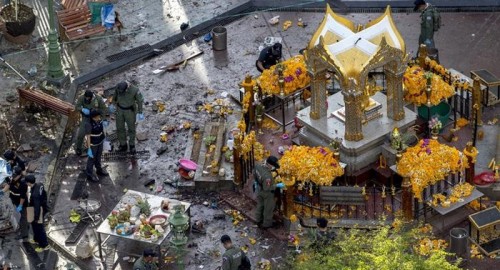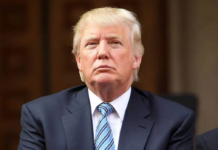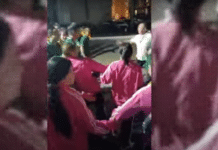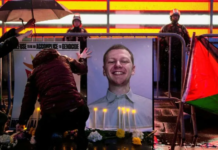Country plagued by military junta and economic downturn
Per-Ake Westerlund, Rattvisepartiet Socialisterna (CWI in Sweden)
The horrific bombing in Thailand’s capital Bangkok on Monday 17 August killed 20 people. 125 of those injured needed hospital care. While no-one has taken responsibility for the bomb, the explosion can have big repercussions for both the ruling military junta and the country’s struggling economy.
The three kilo bomb caused huge devastation in a crowded street close to the skytrain intersection, Ratchaprasong, and the Hindu shrine, Erawan. It was 7pm and most of those killed and injured were tourists from other Asian countries. The Hindu shrine, in a Buddhist-dominated country, is attractive since it is supposed to be a place for prayers and wishes being made.
Central Bangkok has not experienced any similar bomb attack before. It does not have the trademark of the Muslim/Malay separatists of southern Thailand, who have never attacked Bangkok. The bomb has caused widespread fear and speculation. A second bomb on Tuesday, at another skytrain station close to the river, however, was smaller and did not injure anyone.
The bomb explosion came a week after the military stated its goal to keep power for as long as possible. And, at the same time, the country’s economy has been hit by the devaluations of the Chinese yuan currency. But terrorism is no solution and this attack must be condemned outright for the suffering it has caused to ordinary people. It will change nothing. In fact, it will be used as an excuse for tightening measures that can be used against genuine oppositionists.
The military junta
Prime Minister and General, Prayut Chan-o-cha, has been the de-facto dictator of Thailand since May 2014. Anyone doubting that can just read the Bangkok Post or follow any media in the country to see him everywhere. He will now use the attack to strengthen the grip of the military further, calling it “the worst incident that has ever happened in Thailand”.
Since the military coup last year, the junta – the National Council for Peace and Order (NCPO) – has arrested more than 1,000 politicians and activists. Most of them are from the formerly ruling Pheu Thai Party. All protests and political meetings are illegal.
In late June, 14 students were arrested for holding a rally at their university, against military rule. They were charged with breaking the ban on political gatherings and held in prison, waiting for a military court trial. However, the Prayut regime, offered “talks” with the students in order to stem further protests. Prayut told Bangkok Post that he wanted the protest to stop “because he feels uncomfortable seeing them face legal action”. This threat, combined with a “check to see if political groups are behind it” was used to put pressure on the families of the students.
Originally, the junta stated there would be new elections this year, 2015. They were then moved to 2016, and now they are supposed to take place in 2017.
It also clear that Prayut has a “road map” that will guide any coming civilian government. The draft charter for a new constitution includes making “populism” illegal and having a Senate dominated by non-elected senators. In addition, the Constitution Drafting Committee last week proposed a “special crisis committee” to oversee the constitution and its so-called reforms. “The panel, comprised of the PM, House and Senate Speaker, leaders of the armed forces and police chief among others, will remain in place for five years after the charter is promulgated.” (Bangkok Post 17 August).
The political parties
Over the last decade, Thai politics have been dominated by the struggle between two parties – Pheu Thai and the Democrats. The Pheu Thai was founded by the telecom billionaire, Thaksin Shinawatra, who won elections on populist policies such as cheap loans, subsidies and an increased minimum wage. Through this, he won a stronghold in the populous rural parts in the north of the country.
Thaksin was overthrown by the military in 2006. The military, the monarchy and the Democrats, supported by a big share of the national capitalists, thought he had gone too far.
In 2010, violent street clashes took place between supporters of Pheu Thai – the ‘red shirts’ – and Democrats – the ‘yellow shirts’. The military intervened heavily against the red shirts, and more the 100 demonstrators were killed. The slogans of the red shirts were for equality and democracy.
The Pheu Thai Party continued to win elections after the junta had resigned in 2011. With Thaksin in exile, his sister Yingluck Shinawatra became Prime Minister until the new junta’s coup last year. The Democrat Party supported the coup, and as in 2006, the US administration seemed supportive or at least was consulted.
Since the coup, the Pheu Thai Party, has adjusted itself to the military. The “road map” of Prayut wants a “reconciliation government”, with both parties. The two parties have also supported delaying elections for at least two years and a referendum to legitimise the new constitution.
The economy
The military junta has acted to reverse “populism” and step up neo-liberalism. In June, Prayut stated that the free health care which Thaksin implemented in 2001 was “too costly”. The scheme covers 47 million Thais, two thirds of the population, who pay only 30 baht (less than a euro) when visiting a doctor. Already, the junta has abolished subsidies on rice and gas. The minimum wage has been frozen.
These measures, however, have not led to increased growth. Instead, one result has been a cut in domestic demand. The pattern is similar to many other emerging markets. The baht currency has lost value as capital has left the country, mainly because of the expected increase in US interest rates. The central bank responded with two cuts to interest rates in April, but the economy is still in technical deflation (falling prices).
The official prognosis for growth has been cut several times this year, from 3.8 percent to 2.7 percent. The central bank estimates exports will drop by 3.5 percent in 2015. Last week’s devaluation of the Chinese yuan will increase the pressure on the economy further.
The bombing in Bangkok threatens to have a big economic impact. Tourism accounts for 10 percent of the country’s economy, and has been even more important, in the context of a falling currency. There are definitely fears in Thailand of another Asian crisis as in 1997, when the country’s economy was severely hit.
It remains to be seen who was behind the bomb attack in Bangkok. Some suspicion is said to have fallen on expatriate Uighurs or their sympathisers. More than 100 were recently accused of being terrorists and deported to China.
However, the situation in Thailand shows the urgent need for a political party that fights for workers and poor people. Global capitalism and the present military rulers have only new crises in store. Active workers and students in Thailand should study the history of previous struggles, and aim to form their own political voice with a socialist programme.
The CWI has raised these demands for Thailand:
- No to terrorism; yes to mass struggle
- For a united struggle of workers, poor farmers, students and other oppressed people
- No to the rule of generals; end the monarchy
- Organise the election of a genuine, representative Revolutionary Constituent Assembly
- For the building of a mass workers’ and poor farmers’ party fighting for a majority to form a government
- Trade union rights for the armed forces rank and file – win poor soldiers to the struggles of working people
- Full rights for the oppressed Muslim population in the South of Thailand and all other minorities
- No to neo-liberal policies; for democratic public ownership of major industries, large private land-holdings and banks
- For an economy planned to meet the needs of the working people and poor farmers, under the democratic control and management of elected committees from the working class and small farmers
- For a socialist Thailand, as part of a socialist federation throughout South East Asia





